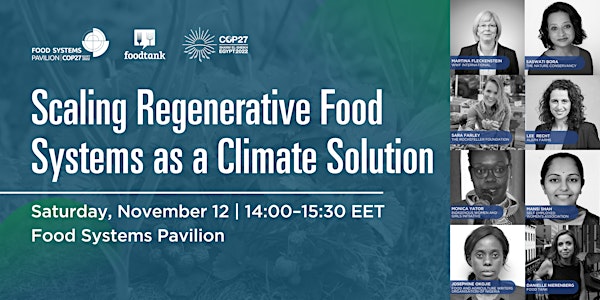
Building Nutrient-Dense Global Food Systems and More at UN COP27
Join us at the Food Systems Pavilion at COP27 to discuss "Building Nutrient-Dense Global Food Systems" and much more. Also streaming.
Date and time
Location
Tonino Lamborghini International Convention Center Sharm El Sheikh
Qesm Sharm Ash Sheikh Sharm El Sheikh, South Sinai Governorate 8764001 EgyptAbout this event
Join us at the Food Systems Pavilion (Blue Zone) in the Tonino Lamborghini International Convention Center Sharm El Sheikh. Streaming details to be added soon for those joining virtually.
Saturday, Nov. 12, 2022
Food Systems Pavilion (Blue Zone) in the Tonino Lamborghini International Convention Center Sharm El Sheikh.
2:00PM–3:20PM
PART 1. Food and agriculture systems can achieve the NDCs while meeting the needs of eaters and policy
Part one will explore the status and prospects of scaling climate-resilient agriculture in national action plans. Nationally Determined Contributions (NDCs) need to be specific and urgent to make change now, not by 2050. What is happening on the ground to ensure that policymakers have the tools they need?
Part 1, Panel 1. NDCs that meet the needs of eaters and policy
2:00PM–2:20PM
Research has shown that transforming food systems can help achieve significant emissions reductions. But these solutions must also consider the needs of those who are producing, processing, transporting, preparing, and consuming food. How can NDCs promote ambitious, actionable, and equitable changes at the national level?
1. Martina Fleckenstein, Global Policy Director Food, WWF International
2. Saswati Bora, Global Director of Regenerative Food Systems, The Nature Conservancy
3. Sara Farley, Vice President, Global Food Initiative, The Rockefeller Foundation
4. Lee Recht, Vice President of Sustainability, Aleph Farms
Moderated by Danielle Nierenberg, President, Food Tank
Part 1, Panel 2. Food and agriculture systems are crucial to achieving NDCs
2:20PM–2:40PM
Every day, food system workers across the world are producing food in a way that’s nourishing for both people and planet. This panel will explore the climate impact of current food and farming systems as well as the potential to drive critical change through solutions already at work on the ground.
1. Patty Fong, Program Director, Climate and Health & Well-Being, Global Alliance for the Future of Food
2. Million Belay, General Coordinator, AFSA
3. Greg Garrett, Executive Director, Access to Nutrition Initiative
4. Josephine Okojie, Journalist, BusinessDay, Food and Agriculture Writers of Nigeria (FAWON)
Moderated by Danielle Nierenberg, President, Food Tank
PART 2. Building Nutrient-Dense Global Food Systems
Food and agriculture systems are responsible for roughly 30 percent of greenhouse gas emissions. Dietary shifts can help improve human health and protect biodiversity while achieving climate goals—shifting to healthy and sustainable diets has been identified as one of biggest way to reduce greenhouse gas emissions.
Part 2, Panel 1. Ensuring nutrient density is a human right
This panel will focus on how food and climate solutions are interlinked. To achieve climate solutions, we need to find ways to ensure that people are nourished, not only filled up with empty calories. Nutrient-dense crops that are accessible and affordable are needed to solve both the hunger and climate crises.
2:40PM–3:00PM
1. Monica Yator, Founder & Executive Director, Indigenous Women and Girls Initiative
2. Ertharin Cousin, Founder and CEO, Food Systems for the Future
3. David Brandes, Co-Founder and CEO, Planetary
4. Jillian Semaan, VP, Sustainability, Ketchum
Moderated by Danielle Nierenberg, President, Food Tank
Part 2, Panel 2. How can nutrient density be a part of national policy?
Most governments continue to ignore nutrition at the expense of their populations. How can policymakers find ways to include farmers, businesses, and eaters in policies that impact food and agriculture systems in the future?
3:00PM–3:20PM
1. Michelle Tigchelaar, Research Scientist, Center for Ocean Solutions, Stanford University
2. Rania Al-Mashat, Minister of International Cooperation, Government of Egypt
3. Hanneke Faber, President of Nutrition, Unilever
4. Mansi Shah, Research, Documentation and Design Consultant, SEWA
Moderated by Danielle Nierenberg, President, Food Tank